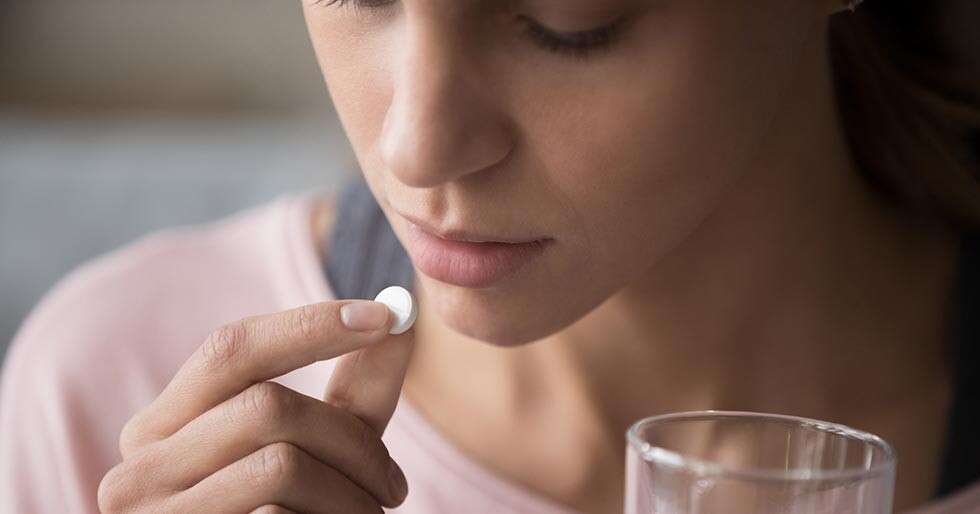Image: Shutterstock
Women often indulge in popping a pill when it comes to period cramps. There is no doubt that painkillers give instant relief from period cramps, but are they safe to take? “While intensity of period cramps vary from one woman to another, taking over the counter pain relievers could be risky,” says Dr Astha Jain Mathur, Consultant Obstetrician & Gynaecologist, Motherhood Hospitals, Indore. She adds, “According to studies, some women suffer from severe period pain similar to a heart attack. This forces them to take painkillers to get instant relief from pain. Some opt for painkillers to keep the period pain from disrupting their work-life and day-to-day activities.”
Image: Shutterstock
For some women, traditional methods like hot compression are not effective in combating period pain. Resorting to painkillers is the only effective way to get relief. But too many pain medications can be risky and may result in a few harmful effects. Dr Mathur says, “Regular pill-popping can result in some health issues, especially if you rely on it every month.” She lists the harmful effects of pain killers as below:
Apart from these common side effects, overuse of painkillers can cause ulcers in the stomach or small intestines. This can cause a lot of pain, and the issue might not be noticeable for a long time. If they do not heal, the woman can suffer from bleeding in the stool, which can be dangerous. In severe cases, the patient has to be admitted to the hospital. For gastrointestinal issues like acid reflux, doctors may recommend the patient balance their acid levels with medications.
How Many Painkillers Are Safe?
Image: Shutterstock
“Avoid painkillers if your pain is manageable, as the side effects can flare up if the medications are taken for long periods. Taking an aspirin/ibuprofen or a paracetamol per day is not much harmful, instead of taking them 3-4 times a day,” suggests Dr Mathur. She advises reaching out to a gynaecologist about severe menstrual cramps and knowing the benefits and risks of taking painkillers. Your doctor will also be able to suggest the right dosage of painkillers for you.
Alternatives For Pain Relief
Image: Shutterstock
There are no effective methods to treat period pain due to less research in the field. Other than natural remedies and methods, women do not have many options. Some of the home remedies and alternatives that can help women are:
Doing some exercises and having sex can help treat menstrual cramps in women. Exercise will be the last thing on your mind, but it becomes an effective method for relief from cramps as it relaxes the tensed muscles. As per research, exercise is the most effective alternative treatment.
As period cramps can increase due to bloating, women must keep themselves hydrated during this time to alleviate pain. Drinking some hot water can relax your muscles, thus, making you feel better.
Placing a heating pad or hot water bottle on the lower abdomen and back can ease menstrual cramps. One can even feel refreshed and active after taking a hot bath. Warmth in the pelvic area can be effective to reduce pain.
Image: Shutterstock
Eating a healthy diet rich in nutrients and vitamins can help ease menstrual cramps. Women should increase their intake of vitamin B1 and add dietary supplements like omega-3 fatty acids, vitamin E, and magnesium to their meals.
Stress can increase the intensity of menstrual cramps. As such, reducing stress and anxiety can help reduce pain during periods.
Dr Mathur adds that there aren’t enough findings on the link between alternative therapies and reduction of menstrual pain, but one alternative therapy, acupuncture, is said to be beneficial. In this method, the specialist will insert needles in different parts of the body, giving gentle pressure on the skin. Acupressure can also help treat period pain, as it stimulates several points in the body.
No Smoking Day: Follow These Self-help Tips To Quit Today!
Get The Health You Deserve
Live The Life You Deserve
Here Are Some Superfoods Recommendations For Kid’s Brain Development
Demystifying Social Egg Freezing, A Fertility Preserving Technique
Things Every Woman Should Know Before Taking Birth Control Pills
Healthy Mind-Body Connection: Paving The Way Towards A Successful Pregnancy
Tips To Prevent Vaginal Infections During The Monsoon
Get Your Flow Back: Ways To Regulate Your Periods
Femina Health Series: Overcoming Risks Of Seeking IVF During COVID Times
We tailor your experience and understand how you and other visitors use this website by using cookies and other technologies. This means we are able to keep this site free-of-charge to use.
Please provide your consent for the following so that we can ensure that you have an enjoyable experience on our website.
In order to access website you need to accept our cookie policy.
View cookie policy.
